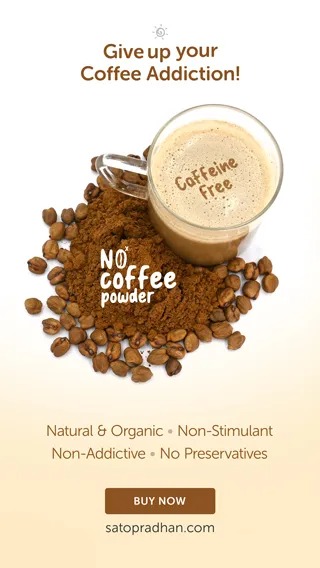
Refined sugar is one of the most commonly used ingredients in an Indian household and is widely used in many food items as a sweetener as well as a preservative, thus making it very difficult to avoid. It is crystallized sucrose obtained from either sugarcane or sugar beets. The juice is extracted after harvesting sugarcane and boiled to reduce the moisture content. As the moisture diminishes, the natural sucrose present in the juice begins to condense and crystallize.

White sugar provides “empty calories” in the form of simple glucose and no other nutrients. This simple glucose easily gets absorbed in the bloodstream and instigates several diseases in the body. A report published by Statista Research Department confirms that Indians consumed 27 million metric tons of white sugar in 2020. Let us now proceed to understand in detail the disadvantages of eating sugar.

Increased Prevalence of Obesity
Today India is home to more than 135 million overweight people, and nearly 39 million kids below five years of age are overweight or obese. The main culprit here is the consumption of sugar. However, most of us say that we only take 1 or 2 tablespoons of sugar every day, but actually, many are entirely unaware of how much sugar they are consuming daily. The average person consumes 22 teaspoons of sugar per day, and much of this is in hidden form. Energy-dense foods, candies, baked goodies, and sweetened beverages are the primary sources of added sugar. But even savoury foods, like bread, tomato sauce, chips and protein bars, contain sugar! Added sugars can be easily concealed on nutrition labels by being listed under several other names, such as palm sugar, agave nectar, corn syrup, cane sugar etc. No matter what it’s called, sugar is sugar, and there are many sugar side effects.
Let’s unpack what happens when kids consume energy-dense food high in sugar & fats. Sugar is a carbohydrate that provides quick energy to the body. Suppose you consume more energy-dense foods, particularly rich in fats and sugars, but do not spend enough energy through exercise and physical activity. In that case, most of the surplus energy will be stored by the body as fat. That fat resides in the intestines, causing an increase in weight or obesity. Since 1975, obesity has become three times more prevalent worldwide in all divisions of society.

Here are some shocking facts:
- In 2010, 3.4 million deaths were estimated due to overweight and obesity.
- In 2016, 1.9 billion overweight adults were reported by WHO worldwide, 650 million of which were obese.
- In 2019, approximately 38.2 million children below the age of 5 years were overweight or obese.
The leading cause of obesity and overweight is an energy imbalance between the consumption & expenditure of calories. Globally there has been:
- Higher consumption of energy-dense foods rich in fat and sugars.
- Decrease in physical activity due to the sedentary lifestyle, industrialization, and urbanization.
Another major cause is an increase in the consumption of sugary drinks over the past 40 years among children and adults who are the topmost victims of sugar side effects. Beverage companies spend huge amounts of money marketing sugary beverages. These companies also advertise calorie-free beverages and encourage individuals to drink the so-called “sugar-free” drinks.

Higher Risk of Diabetes
Diabetes occurs when the body is no longer able to regulate sugar levels effectively. This happens when the pancreas stops producing enough insulin to manage the increased blood sugar levels or cells become resistant to the produced insulin or both. Higher blood sugar levels over a long period can increase the risk of heart disease and nerve or kidney damage. Many studies have shown that those who regularly drink sugar-sweetened beverages have roughly 25% greater risk of developing type 2 diabetes.
Countries with the highest sugar consumption also have the highest rates of type 2 diabetes, whereas places with the lowest sugar consumption have the lowest rates. Many researchers believe that sugar increases diabetes risk directly or indirectly. It may directly increase the risk because of the impact sugar has on the liver, which causes fatty liver, inflammation and localized insulin resistance. It may indirectly increase the risk by contributing to weight gain, and increased body fat-which are separate risk factors.
The University of Surrey, Belgium and Babraham Institute in Cambridge conducted a study and reported that a diet rich in sugar increases the likelihood of developing pancreatic cancer and triggers the formation of tumours in people with specific genetic makeup. If you overeat sugar, your body stops responding appropriately to insulin, and your pancreas starts pumping out more insulin. As a result, the overworked pancreas breaks down, sugar levels increase, and the individual develops a high risk of developing type 2 diabetes & heart disease over time

Weakening of Teeth And Bones
Does eating sweet food hurt your teeth? Have you ever felt slimy and rubbery teeth after drinking cold drinks? Let us understand the reason behind this.
Sugar has a direct correlation with dental problems. Tooth cavities are caused by a sticky substance known as plaque. It binds to teeth and comprises bacteria, saliva, acid and food particles. We all have bacteria in our mouths. After eating or drinking foods loaded with sugar, bacteria in our mouth turn sugar into acid and plaque starts forming on our teeth soon after eating or drinking anything sugary. This plaque sticks to our teeth, and the acid in plaque slowly erodes tooth enamel which is a hard coating that protects our teeth against decay. As our tooth enamel weakens, the risk for decay increases.
Everyone can suffer from tooth decay, but it is most commonly seen in children and adolescents. According to WHO, between 60 to 90 per cent of school children have one dental cavity at least, and between 15 and 20 percent of adults aged 35 to 44 have severe gum diseases.
Apart from increasing the risk of obesity, diabetes and weakening our teeth, there are also other side effects of sugar. Many studies have shown that consumption of sugar can also increase the risk of fracture and rheumatoid arthritis. The refinement of sugar canes causes the removal of around 40 vital nutrients, leaving the white sugar with nothing else than empty calories. In our intestinal system, the breakdown of sugar requires several enzyme processes that depend on B vitamins, calcium, magnesium, and other minerals. Our bones act as the primary “mineral bank” for the breakdown of white sugar. As a result, our bones lose calcium, magnesium, and other minerals, which leads to weak bones.

Addictive Properties
Why do we crave sugar? How often do you think it is ok to eat sweets and treats? Do you find it difficult to stop after eating them a little bit?
Let’s unfold the mystery behind it!
Apart from the other disadvantages of eating sugar, many studies also tell us that excess sugar could be as addictive as some street drugs and have similar effects on the brain. Consumption of sweet foods activates the brain’s reward system and releases a massive amount of dopamine hormone. We feel a pleasurable “high” at that time, and we are inclined to feel it again. That’s why we crave more and more sugary stuff. As we repeat that behaviour more and more, our brain adapts to release a lesser amount of dopamine. The only way to experience the same “high feeling” again is to repeat the behaviour in increasing amounts and frequency. That’s why it is so difficult to resist the urge to consume more sweets leading to binge eating, which is often accompanied by toxic feelings of guilt, shame, and disgust.
Even a single instance of sugar in the bloodstream can harm the brain, resulting in reduced intelligence and deficits in memory and attention. Also, studies show that people with high sugar consumption have reported increased feelings of sadness and anxiety. Yes! This sugar makes us it’s slave!

Slow Poison Behaviour
Sugar is not only a drug but a poison too and the long list of sugar disadvantages goes on! Added sugar is the worst ingredient in the modern diet and can be a health hazard to all. This is because it contains no nutrients and has harmful effects on your overall health. Let’s have a closer look at how it can cause damage to your various organs!
Heart
A 2014 study shows that a diet rich in sugar content increases the risk of dying from a heart attack for an individual even when they aren’t overweight. If at least 25% of calories in your daily diet come from added sugar, then you have a double risk of dying from a heart attack. Sugar can cause harm to your heart in the following ways:
- Increase the risk of heart attack and stroke by spiking blood sugar levels and increasing the likelihood of developing type 2 diabetes.
- Interference in the breakdown of triglycerides (fat in the blood connected with cardiovascular disease).
- Raise the levels of LDL, also known as the “bad” cholesterol and lower the levels of “good” cholesterol (HDL).
- Increase the blood pressure due to an increase in sodium accumulation in the body.
- When you eat excess sugar, the extra insulin in your bloodstream can affect your arteries, causing their walls to get inflamed, grow thicker, and this can lead to heart disease.
Stomach
Sugar sets fire in our stomach, and as a result, food entering our stomach is not mechanically broken down & remains there for a longer duration leading to gas, bloating, stomach pain, indigestion and heartburn. Studies have shown that poor digestion of certain sugars also leads to diarrhoea.
Liver
The abundance of added sugar, when broken down in the liver, is transformed into fat by the process called lipogenesis. This, in turn, causes problems such as the fatty liver. Patients usually don’t experience symptoms but can feel fatigued or pain in the upper right abdomen. A study by The American Journal of Clinical Nutrition showed that if participants consumed an additional 1,000 calories of foods high in sugar over a three-week period, then there will be a 2% increase in body weight but a 27% increase in liver fat. In addition to this, the liver turns excess sugar into triglycerides that can lower good cholesterol while increasing blood pressure, fat around the waist and risk of heart disease.
Brain
Just like drugs, sugar has a similar effect on the reward centre of the brain. When you eat a lot of sugar, your brain releases dopamine – the “feel-good” chemical that steals your intelligence & understanding and eventually impairs your cognitive skills as well as your self-control.
Skin
Overconsumption of sugar can cause glycation, which refers to the natural chemical reaction that happens when sugar levels in our bloodstream spike beyond what our insulin can handle. Excess sugar combines with collagen and elastin components of our skin, making them weaker. This makes the signs of ageing more apparent and aggravates acne and eczema, which gives an overall dull appearance to the individual. Skin loses elasticity and becomes drier, leading to wrinkles and sagging. The more glycation, the quicker the skin ages.
Beware!
This white sweet poison is killing us slowly.
Sugar tastes sweet to your senses but, in reality, there are many side effects of sugar and it is very bitter for the body. A person feels good due to the beta-endorphin rush in the brain while the immune system degenerates. From reducing tissue elasticity to causing life threatening diseases, these crystal cubes affect all vital organs. Without controlled consumption, it can be the reason for white death.

Conclusion
Keeping in mind the sugar disadvantages discussed above, we can now very well understand the detrimental effect of sugar on the human body. WHO recommends lowering free sugar intake at all stages of life to under 10 per cent of physical calories. This corresponds to a maximum of 50g of sugar per day.
Natural sugars, however, do not have such an impact on our health. They are those sugars that naturally exist in fruits & vegetables and have not been added during manufacturing or processing. Since these sugars exist in the combination of fibre, water, antioxidants and other nutrients, they are easily digested. Fruits and vegetables have far less sugar than processed foods, and therefore it is easy to keep the consumption in check.
For example, a peach has 8% sugar by weight, but a common chocolate bar has 50% sugar. Some studies have discovered that eating at least one serving of fruits per day can reduce diabetes risk by 7-13% compared to eating no fruits. It will thus be correct to say that plant-based diets can even help reverse diseases. Apart from fresh fruits, it is suggested to use healthy sugar alternatives such as dates, figs, stevia leaves, chemical-free jaggery (gur) and jaggery powder for leading a healthy, satvic life







